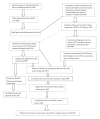Malaria treatment policy change and implementation: the case of Uganda
- PMID: 22312571
- PMCID: PMC3265287
- DOI: 10.4061/2011/683167
Malaria treatment policy change and implementation: the case of Uganda
Abstract
Malaria due to P. falciparum is the number one cause of morbidity and mortality in Uganda where it is highly endemic in 95% of the country. The use of efficacious and effective antimalarial medicines is one of the key strategies for malaria control. Until 2000, Chloroquine (CQ) was the first-line drug for treatment of uncomplicated malaria in Uganda. Due to progressive resistance to CQ and to a combination of CQ with Sulfadoxine-Pyrimethamine, Uganda in 2004 adopted the use of ACTs as first-line drug for treating uncomplicated malaria. A review of the drug policy change process and postimplementation reports highlight the importance of managing the policy change process, generating evidence for policy decisions and availability of adequate and predictable funding for effective policy roll-out. These and other lessons learnt can be used to guide countries that are considering anti-malarial drug change in future.
Figures
References
-
- Okello PE, Van Bortel W, Byaruhanga AM, et al. Variation in malaria transmission intensity in seven sites throughout Uganda. American Journal of Tropical Medicine and Hygiene. 2006;75(2):219–225. - PubMed
-
- Roll Back Malaria Partnership. Global Malaria Action Plan. 2008, http://www.rollbackmalaria.org/gmap/0-5.html.
-
- Ministry of Health. Uganda Malaria Control Policy. 2000.
-
- Kamya MR, Bakyaita NN, Talisuna AO, Were WM, Staedke SG. Increasing antimalarial drug resistance in Uganda and revision of the national drug policy. Tropical Medicine and International Health. 2002;7(12):1031–1041. - PubMed
-
- World Health Organization, Regional Office for Africa, Brazzaville. Framework for Developing, Implementing, and Updating Antimalaria Treatment Policy: A Guide for Country Malaria Control Programmes. 2003, http://afrolib.afro.who.int/documents/2003/english/framedrugp.pdf.
LinkOut - more resources
Full Text Sources


